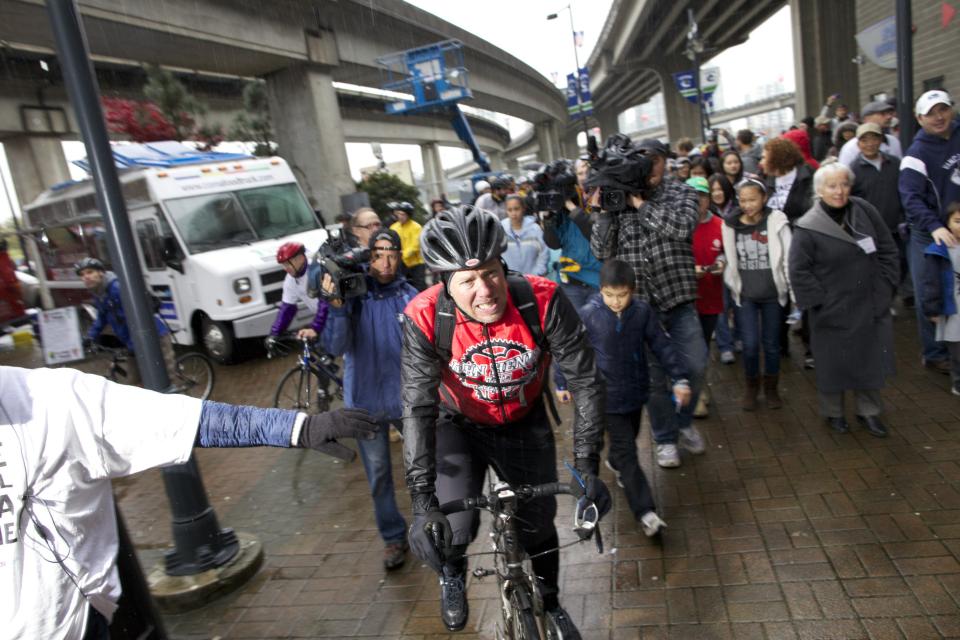Changemakers
Ride Don't Hide
What kind of person would bicycle around the world yelling that he is crazy? A crazy person. Obviously.
My name is Michael Schratter and I am bipolar. I also happen to be a Canadian Jew, a teacher, a part-time journalist, a fiancé, a brother, and a son. But it is the label of mental illness that carries the most weight.
In my opinion, there is no other human affliction still so misunderstood, feared, and ultimately stigmatized. And it is this stigma, along with the prejudice so often encountered by the mentally ill, that is perhaps the greatest issue when it comes to recovery.
Imagine returning to work after a sick leave with a cast on your broken arm. You can expect sympathy, humorous get-well cards, and support from your colleagues. Now imagine yourself returning to work and telling them you were away because of a schizophrenic episode, or a debilitating anxiety attack, or some other onset of acute mental illness. I’m sure you’ll agree that the same social support needed to expedite your healing might not be so readily present. There is also a serious possibility that such forthrightness has jeopardized your future social and professional opportunities, and you are more likely to be ostracized. (A common misconception about people with mental illness is that we’re either dangerous, or at best weird and unemployable.)
A few months before I started the science degree program at UBC in 1993 my father was killed in a bicycle accident. I began university – what should have been an exciting new period of my life – dealing with major anxiety and depression. I eventually succumbed to a manic episode that left me hospitalized, but also set me on the long road to recovery and self-awareness. UBC’s Student Health Services provided me with easy and quick access to the professional help I needed, allowing me to persevere and complete my schooling. After graduating with a degree in biology, followed by another in education, I became a school teacher with the Vancouver School Board.
The psychiatrist I saw when I was a student practiced out of the UBC Hospital and helped a lot of other young adults grappling with mental illnesses and tough academic demands. Knowing I wasn’t alone – that there were other students on campus dealing with similar issues – was extremely comforting and took the edge off my fears for the future. And yet on a social level I was still guarded about what I was going through. For as long as I can remember, the fear of being seen as “crazy,” of being outed as “crazy,” has had me spend enormous amounts of emotional energy in remaining hidden.
As the hyper-social animals we are, it is essential to feel support and empathy when we are hurt. Whether dealing with a physical or psychiatric setback, study after study shows that when we feel support and empathy from those around us during our period of healing we tend to recover faster and to a fuller extent. And yet, regrettably, there is an argument to be made that when suffering with mental illness you might be better off keeping your mouth shut about it, or at least be very selective in choosing who to tell.
It was while dealing with the social repercussions of the manic episode at UBC that I realized the absurd injustice behind my secretive behavior. This inspired a plan to cycle around the world and draw attention to the damaging effects of the stigma surrounding mental illness. Ride Don’t Hide was born. Everyone in my social sphere would know that I was bipolar. Once started, there was no turning back. Why? Because I believe that if we talk about the stigma it will begin to disappear. If we can share the common story of how mental illness affects so many lives, we will see it for what it is: a variation of the human condition.
Cycling as a form of travel was introduced to me by my parents and we enjoyed several family bike trips together in BC and Europe while I was growing up. After my father died, I sought solitude in a solo bike trip across Canada. Upon reaching the shores of Newfoundland, I decided that some day I would cycle around the world. (Apparently, wanderlust has been with me since childhood – a time my mother confesses she nearly sewed address labels into all my clothing so I could always be returned.)
On August 1, 2010, I set out from Vancouver to cycle the equatorial distance of 40,000 km around the planet, a journey that would take me across six continents and 33 countries, and present me with 31 flat tires. The school board granted me a leave and the newspaper Vancouver 24H published a biweekly mental illness awareness column that I wrote from the road. I also partnered with the Canadian Mental Health Association BC (CMHABC). My colleagues there worked hard to create awareness of the Ride Don’t Hide campaign with many successful fundraising efforts.
They say behind every great man there is a great woman. Well I’d say that behind every crazy man there is an extraordinary woman. The fact that I was able to complete the ride, the fact that the campaign reached any level of legitimacy and made any difference whatsoever has everything to do with my partner, Deborah So. Not only did Deborah encourage me to follow my dreams and take the risk, she basically ran the campaign from the corner of her desk while working full-time. On May 12, 2011, after she’d joined me for a month’s cycling through Asia, we were engaged in Hong Kong.
If I were a weak person, I wouldn’t have had the mental strength it required to cycle 16 months, day in, day out …
So what did I learn from the ride? Perhaps it has something to do with being on a bicycle, but no matter where I went people were friendly and helpful. And outside a few harrowing incidents with traffic, never did I feel in danger. Ultimately, I learned that the world is a safe and kind place and I think all we want is just a little respect, we all need a little love. And a person dealing with mental illness is no different.
Having a mental illness has nothing to do with being weak of mind, of bad character or a moral failure. It is a biological affliction like any other. I think for me the greatest triumph of completing Ride Don’t Hide was to prove that point. If I were a weak person, I wouldn’t have had the mental strength it required to cycle 16 months, day in, day out, regardless of the challenges presented by weather, geography and loneliness.
To adequately describe how I felt cycling into Vancouver on the last day of Ride Don’t Hide on November 12, 2011, 469 days after I’d set off is beyond me. Some two hundred cyclists came out that day to ride with me from Tsawwassen to downtown Vancouver. With a police escort leading us the whole way, we arrived wet but safe to a cheering crowd of several hundred waiting for us at Rogers Arena stadium.
I was free.
Months later, after many speaking engagements in schools and businesses, and dozens of interviews in newspapers, TV, and on the radio, I am proud to say that Ride Don’t Hide has helped to diminish the misunderstanding that surrounds mental illness. The campaign has also raised nearly $90,000 in funds towards CMHA BC’s youth education programs.
I continue to be involved with the association’s mental health awareness initiatives and am working with them to have Ride Don’t Hide become an annual mental health awareness community ride here in Vancouver and across many BC communities. And I was recently appointed to the Ministry of Social Development’s Council on Employment and Accessibility.
Although my life with mental illness has been tough at times it is certainly nothing to pity. In some ways I believe that being bipolar has allowed me to persevere and find wells of determination in me that might not have been apparent otherwise. And one thing I am very sure of: being bipolar has made me a much more empathetic man.
Early Alert Initiative
Student mental health is fundamental to learning and UBC has made it a goal to create a campus community that promotes wellbeing. To this end, the university has launched a new program called Early Alert, which will provide better support for students through early identification of issues, appropriate referral, and timely intervention.
Using the new program, professors and staff members identify troubling changes in a student’s habits. Trained advisors review the confidential information and if it looks as though a student might need assistance, an advisor will get in touch with him or her to discuss the concerns.
There are more than 45,000 students on campus. It can be difficult to know if issues like decreased attendance, a few bad marks or a change in mood is a temporary behaviour or a sign of a broader academic, financial or mental health problem.
“Too often faculty and staff see a concern and are not sure how to best support students,” says Janet Teasdale, senior director of Student Development and Services. “The Early Alert approach offers a more coordinated response by providing a care plan and point of connection for each concern.”
Early Alert is part of a broader initiative to enhance student experience and wellbeing by improving how the university supports students across a range of services. This could mean helping students prevent problems from occurring, or offering timely and coordinated services to prevent problems from becoming overwhelming.

































